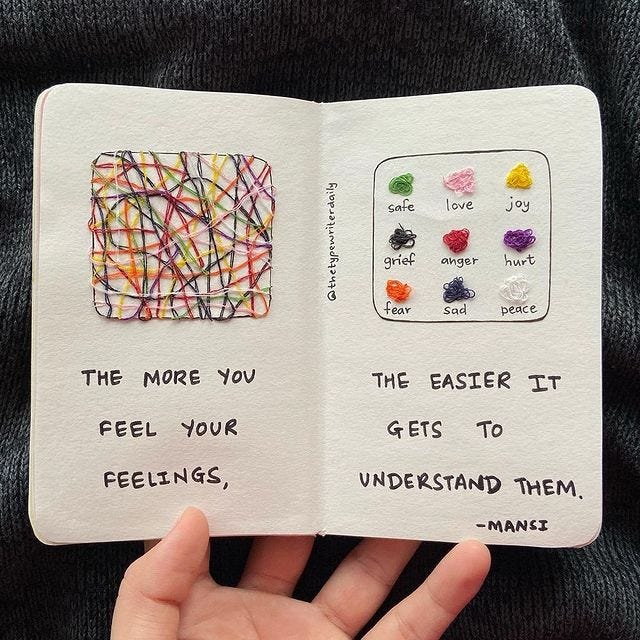The dark revelations of blockchain technology
Underpinings of inequity in crypto, on gay white gaze, transforming ourselves, deep house, and understanding our emotions

Heads up, this is a bit of a longer newsletter capturing many thoughts! Estimated 7min read for the following article.
Hi friend,
For those of you following blockchain news, you may have seen the downward spiral of cryptocurrency valuations, such as Bitcoin and Ethereum. With every meteoric rise, we’ve also seen some historic crashes wiping many life savings within a blink of an eye. 😢 (Great read: They couldn’t even scream any more. They were just sobbing’: the amateur investors ruined by the crypto crash by Sirin Kale of the Guardian)
I was fascinated with this technology more than a decade ago when it hit the scene, and have dabbled in it through its use on the dark web, invested with cold and hot wallet technologies, and played around with decentralized and web3 applications over the years.
Although there is clear “potential” with this technology, continuing to develop into its current state may be the tipping stone of the collapse of the financial and societal frameworks that underlie our functioning society today.
Note: If this is all new to you, some helpful videos explaining blockchain technology and cryptocurrencies. This article won’t get too deep into the details of blockchain technology or cryptocurrencies themselves, and hope to be informative and conversation-starters for both newcomers and veterans in this space.
First, let’s start with the bad.
It’s hard to look away from decades of scams, financial manipulations, and legal issues plaguing this industry.
When technologies outpace legislation, we enter lawless territories in which there are no repercussions or punishments for bad behavior. (We’ve seen this with many of our emerging tech companies including Uber, Airbnb, and Facebook) New investors are often uneducated in the calamitous events in the history of blockchain technology, including the disappearance of an entire exchange (Mt. Gox) in 2014 that misplaced 850,000 Bitcoins (estimated $17B today), a hard fork (aka reset) of Ethereum in 2016 in reaction to the theft of 3.6M Ether (estimated $3.5B today — remember this), and the countless corrupt exchanges and coins that scammed millions from early investors over the years.
In the US, financial institutions are required to have FDIC insurance that protects up to $250,000 per consumer, per bank. Coinbase, the largest publicly traded crypto company, is not required to protect cryptocurrencies under FDIC insurance. As of 2021, Coinbase broke records with 73 million verified users with a total of $65B in assets accounting for 11.3% of total crypto market capitalization (source). That’s quite a lot of money to hold and not be held liable for.
Many popular financial applications, including Venmo and Cash app, introduced their platforms' features to buy and sell cryptocurrencies. For a while, many users were unable to transfer purchased cryptocurrencies out of their wallets and it was rumored that these applications were selling synthetic coins - Bitcoin and Ethereum “alternatives” that follow market trends of their real crypto counterparts, but were not ultimately real and transferrable. (Imagine buying stocks, but they were never real.)
And with the growing popularity of cryptocurrencies and web3, including NFTs, we’ve seen a huge spike in Ponzi schemes and scams. Web3IsGoingGreat.com archives news reports of web3-related scams and estimates about $10B has been lost since its launch in February 2021.
So much of this dark past is rarely shared by companies, investors, and influencers who continue to capitalize on these same schemes today.

Then, we get into the ugly.
White supremacy and patriarchy are deeply intertwined in this industry.
You'll rarely find Black and brown bodies when Google searching “top” crypto and blockchain influencers and speakers at their global conferences (IEEE Global Blockchain Summit, Global Blockchain Convention). Mostly men, white men.
For a global currency and technology, this disproportionate lack of diversity should be a huge red flag for all of us.
Not only does this shed light on who benefits the most in being funded, launching initiatives, and even being included in policies, but also forecasts a darker future in which blockchain technologies and cryptocurrencies may play a role in furthering the shift of power and wealth towards the system of patriarchy and white supremacy.
It comes as no surprise that countless reports published in the past few years have flagged crypto collapses hitting historically Black and brown communities the hardest.
This is by design.
One of the biggest names in this space is Vitalik Buterin, founder of Ethereum. Over the years, I’ve listened to his interviews and noticed his speech and personality evolve into something similar to that of a young Mark Zuckerberg’s megalomania. And similar to Facebook, I see Ethereum following in the same footsteps. (Note: Vitalik is also a cis white male, heralded as a programming prodigy - notice a pattern?)
Big money and power are pushing to make Ethereum the most popular cryptocurrency and technology over its predecessor, an authorless Bitcoin. From running majority of NFTs and their exchanges to the robust decentralized app network and countless supporting foundations and organizations, Ethereum’s capabilities have blossomed far beyond Bitcoin due to its malleability by its human creators.
Note: Ethereum was founded with seed funding from Peter Thiel’s fellowship. Peter Thiel is also an early investor in Facebook and billionaire funder of far-right extremist politics.
Looking at the history of Mark Zuckerberg and Facebook, it is hard not to predict that Vitalik and Ethererum may also co-opt and further institutionalize systems of white supremacy and patriarchy globally in the future, if not already.
Going back to one of Ethereum’s biggest scams mentioned earlier, Vitalik had used his authoritarian rule as its founder to reset the system as he discovered what had happened - undoing the hack and subsequent transactions. This raised many ethical eyebrows.
One of the critiques at the time asked “why now?” pointing at previous hacks to Ethereum impacting other investors that were also not reset. (Something to inquire: who was impacted the most at the time, may have also played a huge role in the reset.)
Now, imagine a financial institution where the biggest players can simply “reset” the system whenever things don’t go as planned for them. (Currently, Ethereum’s market cap sits at $135B)
While many crypto and blockchain enthusiasts eagerly welcome the potential disruption of our corrupt banking institution with its intriguing new technologies, if we do not rally for equitable institutions, individuals, or policies, we may simply be ushering in a more autocratic financial system to come.
And the future…
Looking at this technology, I have strong faith that there will be rapid growth in the future. Blockchain will introduce new, distributed models into our industries in ways we haven’t imagined before. From radically transforming how we bank and transact, to the way we store documentation and files, blockchain can grant us efficiency, scale, and individual control far beyond our current capabilities.
However, I also do believe that this technology has already been corroborated for dark, inequitable, self-interested purposes. There is a very high possibility that these tools may usher in a new degree of oppression that we have yet to experience.
For those looking to invest or build into this space…
Understand that these systems are inequitable in their current state and that without legislation or external checks and balances in place, there is nothing to shield individuals and communities from harm. Within a system of inequity, the first-mover advantage will subsequently reward those with more privilege and power. (And if we have money to invest, a question that I’ve prompted some of my clients is - what does it mean to invest into yourself during this time?)
As individual investors, we must make the decision of whether or not we co-opt these systems for profit. When we have the opportunity, invest in technology and teams that are not a part of the dominant narrative to create equitable systems and redistribute power. It is never too late to do better with the knowledge we gain each day.
And finally, with new and emerging technologies, it is important for us to study and understand them, and to rally for legislation protecting our communities. Especially for those who sit on the intersectional axis with disproportionately lower privilege, we all have the civic duty to protect one another as compassionate human beings.
What I’m up to
A new Yellow Glitter Podcast episode, we are joined by a special returning guest, Johnathan Gibbs, to talk about the latest gay movie Fire Island, and also reflect on the harmful impact of the gay white gaze on our queer Asian communities.
Apple Podcast | Google Podcasts | Stitcher | Tune In | iHeartRadio | Overcast | Spotify
For our community
For queer Asians: Thu, July 14 - Yellow Glitter Sparkles
For Asians: Wed, July 20 - Asian American Healing Space
(✨New✨) For BIPOC: Thu, July 28 - BIPOC Creative Seminar (Getting beyond creative blockages with Dalia Kinsey, author of Decolonizing Wellness)
(✨New✨) For BIPOC: Tue, Aug 23 - BIPOC Healing Space (with Miraj Jiwani)
Something to read
A beautiful essay on the state of our consciousness and battle: Murmurations: Returning to the Whole by Adrienne Maree Brown. Two quotes that I resonated with:
Grace also said, “We must transform ourselves to transform the world,” which is taking me years to understand and embody. The way I think of it now is in the framework of the imagination battle: there is a war going on for the future—it is cultural, ideological, economic, and spiritual. And as in any war, there is a front line, a place where the action is urgent, where the battle will be won or lost. The world, the values of the world, are shaped by the choices each of us makes. Which means my thinking, my actions, my relationships, and my life create a front line for the possibilities of the entire species. Each one of us is an individual practice ground for what the whole can or cannot do, will or will not do.
Some of us know there is no supremacy amongst us as a species. Some of us know humans aren’t meant to be the center of creation. In the same way we had to evolve our thinking from the sun orbiting Earth to the more humbling truth that we are one of many planets orbiting the sun, we must remember (or learn) that the Earth is not designed only for us humans to consume and destroy. We must recognize it is meant to serve all the biodiverse species who walk and fly and swim and form mountains here.
Something to listen
I’ve been obsessing over this DJ duo Sultan & Shepard. Check out this beautiful visual and music from Topanga, CA. (Excited to see them in town in NYC on Aug 20!)
Something to reflect
Reshared this image on my social media channels to understand our emotions. Thought it did an amazing job of capturing their complexity & simplicity.
No emotions are inherently “bad” or “good”. They are just bits of information to help us better understand the world around us.
As always, thanks for reading!
P.S. If you enjoyed this, share or sign up here: mindfulmoments.substack.com
Anything else? You can always hit "reply" to email me directly. 💌
Have a beautiful day!
Metta (loving-kindness),
Steven
Follow: Twitter | LinkedIn | Instagram | YouTube | Facebook | TikTok
Collaborate: Stranger Creative | StevenWakabayashi.com
Support: QTBIPOC Design | Mindful Sights
Listen: Yellow Glitter Podcast







